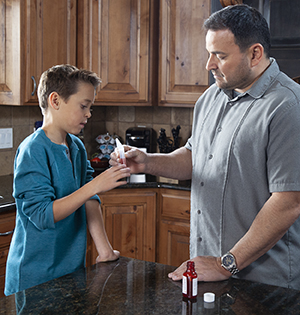What are antibiotics?
Antibiotics are powerful medicines used to treat certain bacterial infections. Antibiotics don't cure all infections. And antibiotics that are used when not needed can be harmful.
There are 2 main types of germs that cause most infections. These are viruses and bacteria.
Viruses cause:
-
Colds and flu (including COVID-19)
-
Runny noses
-
Most coughs and bronchitis
-
Most sore throats
Antibiotics can't kill viruses. They can't help you feel better when you have a virus.
Bacteria cause:
-
Most ear infections
-
Some sinus infections
-
Strep throat
-
Urinary tract infections
-
Stomach sores (ulcers)
Antibiotics do kill specific bacteria.
Some viruses cause symptoms that seem like a bacterial infection. Some bacteria can cause symptoms that seem like a viral infection. Your child's healthcare provider can determine what type of illness your child has. They will advise the right type of treatment.
What are resistant bacteria?
When you use antibiotic medicine, it kills bacteria. But resistant bacteria don't respond to the medicine. They don’t all die. They continue to cause infection. In some cases, the bacteria are already resistant to some antibiotics. But bacteria may also become resistant during treatment. A person’s body does not become resistant to antibiotics. The bacteria become resistant to the medicines.
Each time you give your child an antibiotic when it’s not needed or stop giving it before all the medicine is gone, you raise the risk of making resistant bacteria. Because of this, some diseases that used to be easy to treat are now very hard to treat. It's very important to use antibiotics only when needed.
It’s important to know that:
-
Antibiotic resistance is a problem for both children and adults.
-
Resistant bacteria happens when bacteria survive the use of medicines meant to kill or weaken them.
-
If a germ is resistant to a lot of medicines, treating the infections can be very hard or even impossible.
-
Someone with an infection that is resistant to a medicine can pass that infection to another person. In this way, a hard-to-treat illness can be spread from person to person.
-
In some cases, an antibiotic-resistant illness can lead to serious disability or even death.
-
Resistance can happen if a bacterial infection is only partly treated. To prevent this, give your child the full course of antibiotics as directed. Don't stop the medicine, even if your child is feeling better.
When are antibiotics needed?
This is a complex question. It should be answered by your child's healthcare provider. The answer depends on the diagnosis. For example, there are several types of ear infections. Some need antibiotics, but some don't. Most cases of sore throat are caused by viruses. Strep throat caused by a specific type of bacteria needs antibiotics. Strep throat is diagnosed by a lab test.
Common viral infections, like coughs or a cold, can lead to a bacterial infection. But treating a virus with antibiotics to prevent a bacterial infection is not advised. This is because of the risk of causing resistant bacteria.
Remember:
-
Antibiotics don't work against viral colds and the flu. Other types of medicines work against certain viruses, especially flu and COVID-19. Unneeded antibiotics can be harmful.
-
Talk with your child's healthcare provider about antibiotics. Learn about the differences between viruses and bacteria. Learn when antibiotics should and should not be used.
-
If your child does take an antibiotic, give it exactly as prescribed. Have your child finish all of the medicine. Don't stop the medicine when your child feels better. You should not have any medicine left over.
-
Never try to save leftover antibiotics to use "just in case." This can also lead to resistant bacteria.
-
Don't share your antibiotics with someone else. Don't take an antibiotic that was prescribed for someone else.
How to help your child stay healthy
-
Keep your child up-to-date with vaccines, especially for flu and pneumonia.
-
Teach your child how to wash their hands correctly.
-
Teach your child not to touch their eyes, nose, or mouth with dirty or unwashed hands.
-
Stay away from people sick with colds or other infections.
-
Teach your child to cover their mouth and nose when coughing or sneezing.
-
Keep your child home if they are sick.
Featured in


